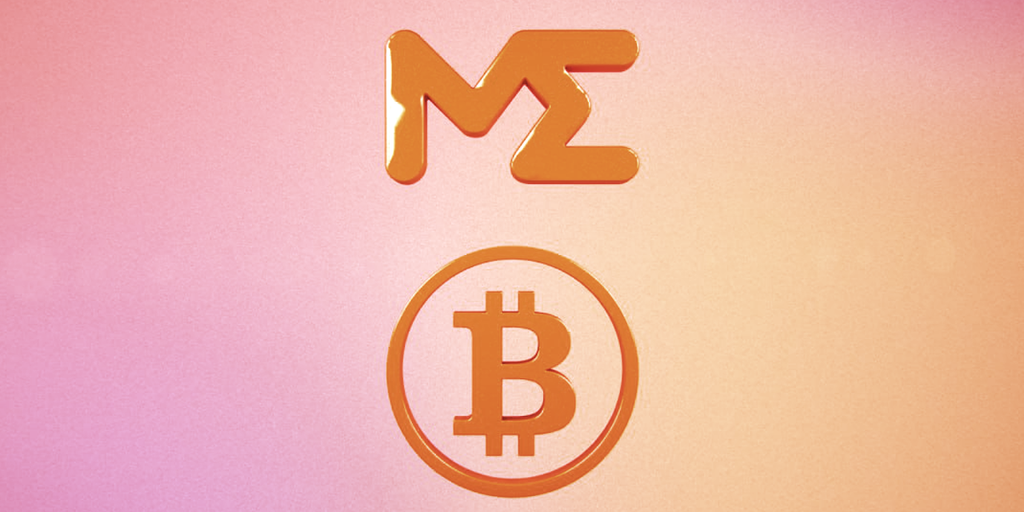[ad_1]

“Bitcoin NFTs” have taken off over the last two months thanks to the launch of Ordinals, a protocol that lets people digitally imprint media and text on the original blockchain—with more than 500,000 such “inscriptions” made to date. Now, one of the leading NFT marketplaces on other chains has made a move to support Bitcoin, as well.
Magic Eden, the largest Solana NFT marketplace, announced today that it has added support for Bitcoin Ordinals. It’s the latest multi-chain move for the startup—which was valued at $1.6 billion as of June 2022—after expanding to Ethereum and Polygon last year.
Ordinals are a relatively new breakthrough for Bitcoin, enabling the on-chain storage of media without the use of smart contracts as on other chains, and much of the tooling is still being built in real time. As a result, minting, handling, and trading Ordinals is a more complicated process than on other chains like Ethereum and Solana, thanks in part to the lack of infrastructure.
Even so, Magic Eden says that its Ordinals marketplace experience will be similar to what users are used to experiencing on its platform.
As a non-custodial marketplace, Magic Eden itself never takes control of assets being traded, and it will support the Ordinals-compatible Hiro and Xverse wallets at launch. Magic Eden claims that it is the first fully audited Ordinals marketplace.
“The core marketplace functionality should feel really, really similar for users, and hopefully it gives people the perception that the [Ordinals] hurdle is not crazy,” said Magic Eden co-founder and COO Zhuoxun Yun. “As long as I have a little bit of Bitcoin in my wallet, I can just get going and it would feel the same as if I’m trying to try to buy something on ETH.”
Magic Eden’s marketplace launch suggests that Ordinals tooling and infrastructure are spinning up quickly. As recently as early February, when Bitcoin NFT buzz was first heating up, some traders were using public spreadsheets and Airtable forms to coordinate asking prices and trades, since formal marketplaces still hadn’t been developed.
The first Bitcoin Ordinals marketplaces, including ORDX and Generative, launched later in February, with others joining the fray since—including Gamma, a marketplace first established for NFTs on Stacks, a Bitcoin scaling network. Trustless marketplaces, including the Magic Eden one, are a big step up for Ordinals in terms of security, accessibility, and scalability.
Yun said that interest from creators will help dictate the future direction for Magic Eden’s Bitcoin marketplace. It’s still relatively early days for Ordinals, but even so, the limitations of the protocol suggest that it’s a better fit for some types of on-chain assets—like limited edition artwork—than others, such as large-scale video game NFT collections.
Still, Magic Eden already has some plans ahead. Right now, the Ordinals marketplace is focused on secondary market sales, but the firm plans to offer future tools for minting (or inscribing) digital assets onto the Bitcoin blockchain. Yun said it’s still unclear whether that will take the form of a minting launchpad, which it offers on Solana and other platforms, or auctions.
Igor Milihram, who handles business development for Magic Eden, said that the idea of inscribing digital artifacts on Bitcoin lit a spark under the team, who “fell in love” with the idea of Bitcoin NFTs. Having the artwork stored fully on-chain gives Ordinals a different value proposition than some other NFT chains, too.
“It stays on every node, forever,” he told Decrypt. “Even if the apocalypse hits, there will be computers that will have Bitcoin on their hard [drives], and they will be able to spin it up. It’s kind of undestroyable in that way. And that gives those assets more value.”
Stay on top of crypto news, get daily updates in your inbox.
[ad_2]
Read More: decrypt.co








 Bitcoin
Bitcoin  Ethereum
Ethereum  Tether
Tether  XRP
XRP  Solana
Solana  USDC
USDC  TRON
TRON  Dogecoin
Dogecoin  Lido Staked Ether
Lido Staked Ether  Cardano
Cardano  Wrapped Bitcoin
Wrapped Bitcoin  Hyperliquid
Hyperliquid  Wrapped stETH
Wrapped stETH  Bitcoin Cash
Bitcoin Cash  Sui
Sui  Chainlink
Chainlink  LEO Token
LEO Token  Stellar
Stellar  Avalanche
Avalanche  USDS
USDS  Toncoin
Toncoin  WhiteBIT Coin
WhiteBIT Coin  Shiba Inu
Shiba Inu  WETH
WETH  Litecoin
Litecoin  Wrapped eETH
Wrapped eETH  Binance Bridged USDT (BNB Smart Chain)
Binance Bridged USDT (BNB Smart Chain)  Hedera
Hedera  Monero
Monero  Bitget Token
Bitget Token  Ethena USDe
Ethena USDe  Polkadot
Polkadot  Coinbase Wrapped BTC
Coinbase Wrapped BTC  Pi Network
Pi Network  Uniswap
Uniswap  Pepe
Pepe  Aave
Aave  Dai
Dai  Ethena Staked USDe
Ethena Staked USDe  Aptos
Aptos  OKB
OKB  BlackRock USD Institutional Digital Liquidity Fund
BlackRock USD Institutional Digital Liquidity Fund  Bittensor
Bittensor  NEAR Protocol
NEAR Protocol  Internet Computer
Internet Computer  Cronos
Cronos  Jito Staked SOL
Jito Staked SOL  Ethereum Classic
Ethereum Classic  sUSDS
sUSDS